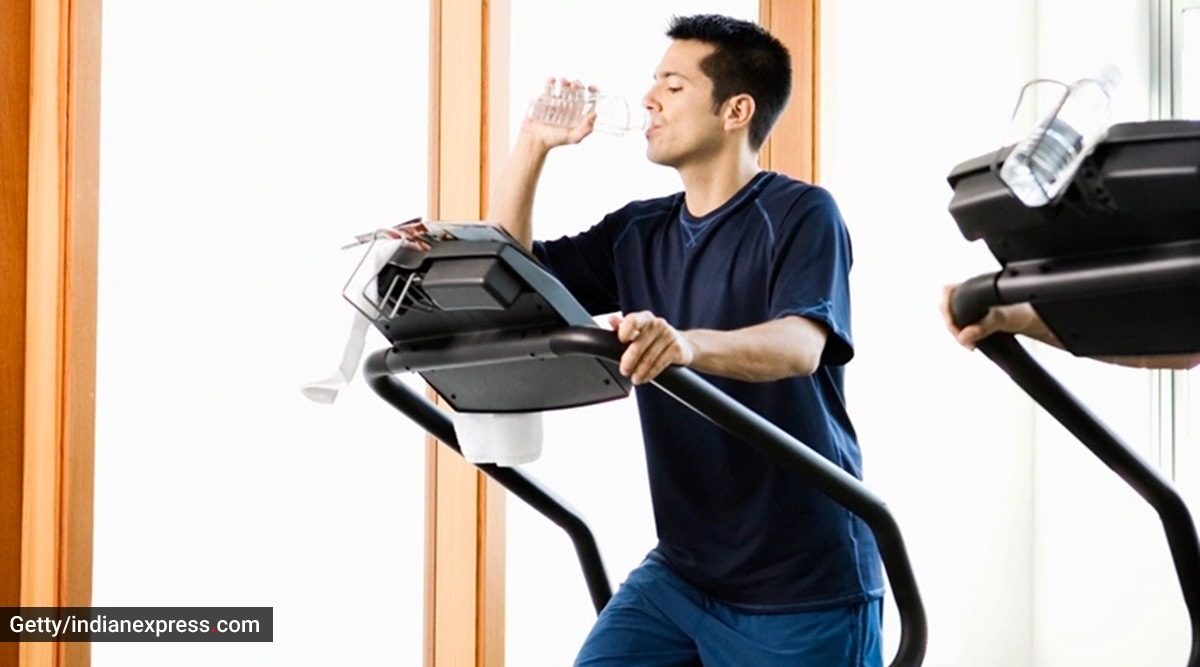📣 For more lifestyle news, click here to join our WhatsApp Channel and also follow us on Instagram
Research indicates link between exercise timing and blood sugar control; know more
The University of Bath study team found that persons who had fasted overnight can use more fat during exercise because their insulin levels are lower
 It matters when you exercise (Source: Getty Images/Thinkstock)
It matters when you exercise (Source: Getty Images/Thinkstock) In our pursuit of better health, we often focus on the importance of exercise and a balanced diet. But, what if the timing of these two essential elements could make a significant difference in our general health? Researchers at the University of Bath have recently found a connection between exercise timing and blood sugar control. Their six-week study reveals that exercising before breakfast can lead to burning twice as much fat, benefiting individuals in various ways, including improved blood sugar levels and reduced risk of diabetes and heart disease.
Published in the Journal of Clinical Endocrinology and Metabolism, the study involved 30 men classified as obese or overweight. The study compared results from two intervention groups wherein one group consisted of people who ate breakfast before/after exercise and a control group who made no lifestyle changes.
Over the six-week trial, the scientists found that the muscles from the group who exercised before breakfast were more responsive to insulin compared to the group who exercised after breakfast, in spite of identical training sessions and matched food intake.
The study team found that persons who had fasted overnight can use more fat during exercise because their insulin levels are lower. This enables them to use more fat from their fat tissue and muscle as fuel. As a result, their bodies responded better to insulin, keeping blood sugar levels under control and potentially lowering the risk of diabetes and heart disease.
 Here’s how exercise impacts your heart (Source: Getty Images/Thinkstock)
Here’s how exercise impacts your heart (Source: Getty Images/Thinkstock)
The muscles of those who exercised before breakfast also showed greater increases in key proteins, specifically those involved in transporting glucose from the bloodstream to the muscles.
Professor Javier Gonzalez, the Department for Health at the University of Bath explained in a statement, “Our results suggest that changing the timing of when you eat in relation to when you exercise can bring about profound and positive changes to your overall health.”
“We found that the men in the study who exercised before breakfast burned double the amount of fat than the group who exercised after. Importantly, while this didn’t have any effect on weight loss, it did dramatically improve their overall health. The group who exercised before breakfast increased their ability to respond to insulin, which is all the more remarkable given that both exercise groups lost a similar amount of weight and both gained a similar amount of fitness. The only difference was the timing of the food intake.”
Pondering over the analysis, neurologist Dr Sudhir Kumar told indianexpress.com that on empty stomach, one can not go for long-distance running (such as half or full marathons) and one would find it difficult to run at a faster pace on empty stomach. These require intermittent fueling during the runs.
“Running on an empty stomach (before breakfast) has some other advantages too. It is convenient to run in the mornings, as there is time available for that. One can not go for a run immediately after breakfast, as there would be a need to wait for a few hours to digest the food (by then it will be time to leave for work). People who run in the mornings before breakfast also tend to consume lesser calories during the next 24 hours and that can aid in weight loss too,” said Dr Kumar, who lost 29 kgs owing to running in the mornings before breakfast along with a low-calorie diet and good sleep.
This calls for valuable measures for optimising one’s exercise and eating routine. Dr Hansaji Yogendra, director, The Yoga Institute suggested the following:
Try fasting workouts
Consider fasted workouts into your weekly exercise routine. However, it’s essential to listen to your body and start slowly, especially if you’re not accustomed to exercising on an empty stomach. Light to moderate activities such as walking and yoga are excellent starting points.
Drink sufficient water
Before engaging in a fasted workout, it’s crucial to stay well-hydrated. Drinking a glass of water upon waking helps kickstart your metabolism and prepares your body for physical activity.
Eat with consideration
Practising mindful eating is vital, regardless of when you exercise. Be aware of portion sizes, eat slowly, and savour each bite. Avoid distractions like screens while eating, as it can lead to overeating and disrupt your body’s natural hunger and satiety signals.
 Ensure you stay hydrated when exercising (Source: Getty Images/Thinkstock)
Ensure you stay hydrated when exercising (Source: Getty Images/Thinkstock)
Maintain consistency
Whether you choose to exercise before or sometime after breakfast, try to maintain a regular schedule. Set aside dedicated time for physical activity, and gradually increase the intensity and duration of your workouts as your fitness level improves.
By adopting simple lifestyle tips such as these, you can optimize your blood sugar levels, reduce the risk of diabetes and heart disease, and maximise your health and vitality.
📣 For more lifestyle news, follow us on Instagram | Twitter | Facebook and don’t miss out on the latest updates!
📣 For more lifestyle news, click here to join our WhatsApp Channel and also follow us on Instagram



- 01
- 02
- 03
- 04
- 05























